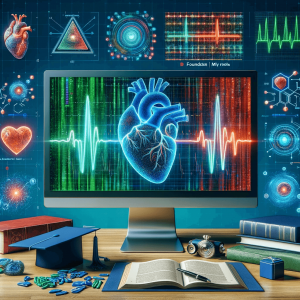Deep Learning Based Anomaly Detection in ECG Signals Using Foundation Models
From iis-projects
Contents
Introduction and Project Description
Cardiovascular diseases stand as a predominant cause of death worldwide, presenting a significant challenge to global health systems. Early detection and timely intervention in these conditions are paramount to reduce mortality rates and improve patient outcomes. Central to this early detection is electrocardiograms (ECG), a critical diagnostic tool that provides a graphical representation of the heart's electrical activity. ECGs are instrumental in identifying various heart conditions, including arrhythmias, myocardial infarctions, and other cardiac anomalies. However, the traditional approach to ECG analysis, which relies heavily on manual examination by healthcare professionals, is not without its limitations. This process can be labor-intensive, time-consuming, and subject to human error, potentially leading to misdiagnoses or delayed treatment.
In response to these challenges, this project aims to develop a groundbreaking, automated system for detecting anomalies in ECG signals, utilizing the latest advancements in deep learning and foundational models. This system is designed to leverage the capabilities of artificial intelligence to interpret ECG data with precision and efficiency that surpasses traditional methods.
The core of this initiative involves training deep learning models on extensive datasets of ECG recordings. These models will be adept at identifying subtle patterns and deviations in the ECG signals that may indicate the presence of cardiovascular anomalies. By incorporating a wide range of ECG data, including signals from diverse patient populations and various cardiac conditions, the models will be well-equipped to recognize a broad spectrum of cardiac irregularities.
Furthermore, using foundational models in this project represents a significant innovation in medical diagnostics. These models, characterized by their extensive pre-training on large datasets, bring a heightened accuracy and adaptability to the analysis of ECG signals. Their ability to generalize from vast amounts of data makes them particularly suitable for this application, where detecting minute and often complex anomalies is critical.
The ultimate goal of this project is to create an automated ECG analysis system that is not only highly accurate but also efficient and scalable. This system can transform current practices in cardiovascular diagnostics, making early detection more accessible and reliable. In doing so, it could significantly contribute to reducing the global burden of cardiovascular diseases, ultimately saving lives and improving the quality of healthcare delivery. Your task:
- To create a deep learning model for accurate ECG anomaly detection: Employ foundational models to analyze ECG data and identify abnormalities.
- To utilize large-scale, open-source ECG datasets for training: Leverage diverse datasets to ensure the model is robust and generalizable.
- To compare the model's performance with traditional methods: Assess the model's effectiveness in real-world scenarios against standard ECG analysis techniques.
Methodology
- Dataset Assembly: Gather and preprocess open-source ECG datasets on various cardiac conditions.
- Model Development: Design and train a deep learning model, integrating concepts from existing successful foundational models.
- Anomaly Detection Implementation: Implement the model to identify anomalies in ECG signals, such as arrhythmias, myocardial infarction indicators, etc.
- Performance Evaluation: Test the model using standard metrics like sensitivity, specificity, and ROC-AUC. Conduct a comparative analysis with conventional ECG analysis methods.
- Refinement: Based on testing results, refine the model to improve accuracy and reliability.
Expected Outcomes
- A highly accurate deep learning model for ECG anomaly detection, contributing to faster and more reliable cardiac disease diagnosis.
- A comprehensive analysis of the model's performance, providing insights into the potential of foundational models in medical diagnostics.
- Publication-worthy results that can be shared with the medical and AI research communities.
Status: Available
- Looking for Master Project Students
- Supervision: Thorir Mar Ingolfsson, Andrea Cossettini, Yawei Li
Your Profile
- Background in Engineering (Biomedical, Mechanical, Chemical…)
- Familiar with Deep Learning, experience with TensorFlow or PyTorch
- Motivation to work on a project at the intersection of Neuroscience and Engineering
- Willingness to work in an interdisciplinary team (Hardware, Machine Learning, Psychology, Neuroscience)
Reach out
If you are interested, we would love to get to know you! Please write an Email to all of us, including your motivation, CV, and transcript of records:
- Thorir Mar Ingolfsson: thoriri@iis.ee.ethz.ch
- Andrea Cossettini: cossettini.andrea@iis.ee.ethz.ch
- Yawei Li: yawei.li@vision.ee.ethz.ch
